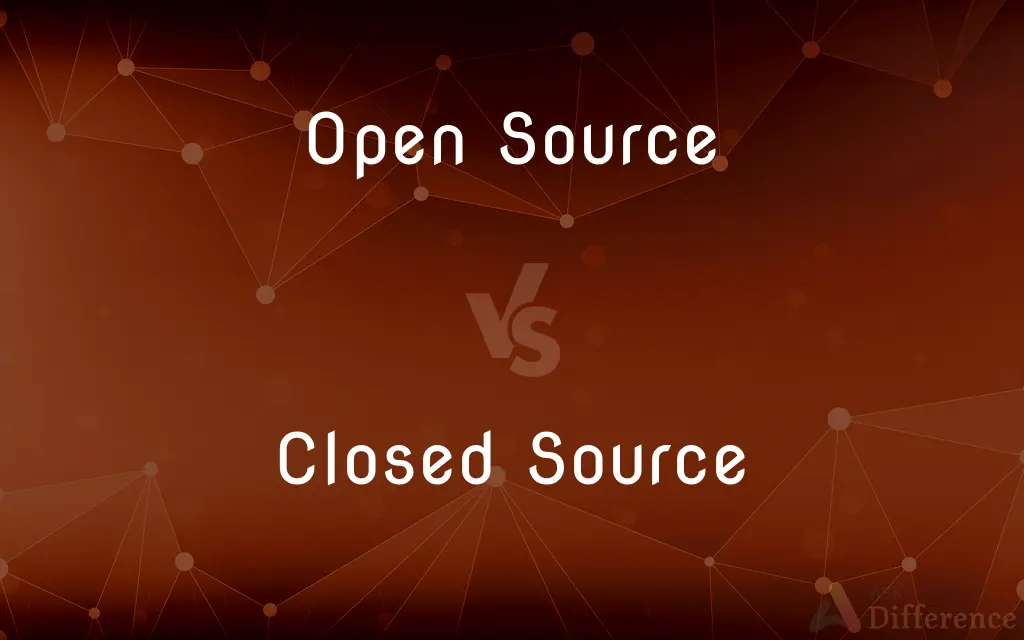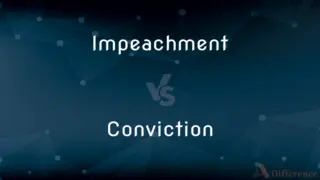Open Source vs. Closed Source — What's the Difference?
By Tayyaba Rehman & Fiza Rafique — Published on September 29, 2023
Open Source software has publicly available source code that anyone can inspect, modify, and distribute. Closed Source software keeps its source code proprietary and restricts access, modification, and distribution.

Difference Between Open Source and Closed Source
Table of Contents
ADVERTISEMENT
Key Differences
Open Source software allows developers and users to access, modify, and distribute its source code. This fosters a collaborative environment and often results in rapid development and debugging. Closed Source software, on the other hand, keeps its source code hidden and proprietary, which often results in more polished but less adaptable products.
Open Source platforms usually allow for a great degree of customization, as users can modify the source code to better fit their needs. Closed Source software typically offers less flexibility because you cannot access or alter the source code, thus limiting customization to the features that the developers provide.
In terms of cost, Open Source software is usually free to use and distribute, though some Open Source projects may offer paid versions with additional features or support. Closed Source software often requires users to purchase a license, and any form of distribution usually violates the terms of service.
Open Source projects often rely on community contributions and may lack formal technical support. Closed Source products often come with customer support, user guides, and warranty, offered by the company that owns the software. This makes Closed Source software often more user-friendly but at the expense of adaptability.
Comparison Chart
Source Code Accessibility
Publicly available
Proprietary/Restricted
ADVERTISEMENT
Customization
High
Low
Cost
Usually free
Requires purchase
Development Model
Community-based
Company-based
Support
Community support
Formal customer support
Compare with Definitions
Open Source
Community-Driven: "Open Source usually relies on community contributions."
Several developers contribute to this Open Source project.
Closed Source
Commercial: "Closed Source software is often commercial and requires a paid license."
Adobe Photoshop is a popular Closed Source application.
Open Source
Free to Modify: "Open Source allows users to modify the source code."
John tweaked the Open Source software to better fit his needs.
Closed Source
Restricted Modification: "Closed Source restricts any modifications to the source code."
You cannot legally modify the source code of this Closed Source program.
Open Source
Public Code: "Open Source means the source code is publicly available."
Linux is an Open Source operating system.
Closed Source
Proprietary: "Closed Source means the source code is proprietary and not publicly accessible."
Microsoft Windows is Closed Source software.
Open Source
Collaborative: "Open Source fosters a collaborative development environment."
Open Source projects often benefit from worldwide collaboration.
Closed Source
Controlled: "Closed Source is controlled by a single entity or organization."
The development of Closed Source software is usually tightly controlled.
Open Source
Customizable: "Open Source is highly customizable due to its open nature."
You can add your own features to Open Source software.
Closed Source
User-Friendly: "Closed Source software often comes with dedicated customer support."
If you have problems with the Closed Source software, you can contact customer support.
Open Source
Open to public participation, as in the sharing of information or the development of software
An open-source operating system.
Closed Source
Whose constituent makeup, or source code, is not made publicly available.
Open Source
(software) Of or relating to a product which is licensed to permit modifications and redistribution of its source code.
Linux is an open-source operating system.
Open Source
(by extension) Describing any product whose composition or method of manufacturing is public knowledge and not proprietary.
Open-source cola
Open Source
(espionage) Relying on publicly available information (open sources).
Open-source intelligence
Open Source
(transitive) To release the source code of.
Open Source
Of or relating to or being computer software for which the source code is freely available
Common Curiosities
Is Open Source free?
Open Source software is often free to use, although some may offer paid versions with additional features.
Is Closed Source free?
Closed Source software usually requires users to purchase a license.
Can I modify Open Source software?
Yes, one of the main advantages of Open Source is that you can modify its source code.
Who develops Closed Source software?
Closed Source software is typically developed by a company or a dedicated team.
What is Open Source?
Open Source means that the source code is publicly available for inspection, modification, and distribution.
What is Closed Source?
Closed Source software keeps its source code proprietary and restricts any form of modification or distribution.
Can I modify Closed Source software?
No, modifying Closed Source software usually violates its terms of service.
Does Open Source software have customer support?
Open Source projects often rely on community support rather than formal customer service.
Does Closed Source software have customer support?
Yes, Closed Source software usually offers dedicated customer support.
Can I distribute Open Source software?
Usually, yes, although some licenses may have restrictions.
Is Open Source software safe?
Open Source software is generally safe, but it’s crucial to download from reputable sources.
Who develops Open Source software?
Open Source software is often developed through community contributions.
Can I distribute Closed Source software?
No, distributing Closed Source software typically violates its terms of service.
Is Closed Source software safe?
Closed Source software is often considered safe, especially when provided by reputable companies.
How customizable is Open Source software?
Open Source software is highly customizable as users have access to the source code.
Share Your Discovery

Previous Comparison
Lack vs. Pool
Next Comparison
Impeachment vs. ConvictionAuthor Spotlight
Written by
Tayyaba RehmanTayyaba Rehman is a distinguished writer, currently serving as a primary contributor to askdifference.com. As a researcher in semantics and etymology, Tayyaba's passion for the complexity of languages and their distinctions has found a perfect home on the platform. Tayyaba delves into the intricacies of language, distinguishing between commonly confused words and phrases, thereby providing clarity for readers worldwide.
Co-written by
Fiza RafiqueFiza Rafique is a skilled content writer at AskDifference.com, where she meticulously refines and enhances written pieces. Drawing from her vast editorial expertise, Fiza ensures clarity, accuracy, and precision in every article. Passionate about language, she continually seeks to elevate the quality of content for readers worldwide.













































